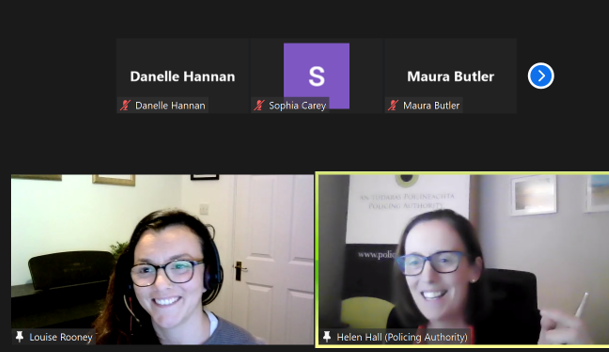The ACJRD Mental Health and Juvenile Justice Working Groups, in collaboration with the Policing Authority, held this online seminar on Wednesday, 1st December, 2021.
‘The Garda Síochána and Child Mental Health: An investigation of pathways to crisis mental health care’ report has been published by the Policing Authority. This research was conducted by Professor Fiona McNicholas and Dr. Louise Rooney, Department of Child and Adolescent Psychiatry, UCD School of Medicine and Dr. Deirdre Healy, UCD Institute of Criminology and Criminal Justice, Sutherland School of Law, University College Dublin. This is the second of two pieces of research funded by the Policing Authority’s inaugural Research Bursary Scheme in 2019.
In collaboration with the Policing Authority and the research team, the ACJRD Mental Health and Juvenile Justice Working Groups held an online seminar hosted by Helen Hall, Chief Executive, Policing Authority, where Dr. Louise Rooney made a presentation on the report.
To view the report, please click here.
This small-scale qualitative study examines the current care pathways of children experiencing a crisis mental health event, from first contact with the Garda Síochána through to mental health assessment and care. The research identifies the opportunities and challenges associated with the pathways to child and adolescent psychiatric care via the criminal justice system from the perspective of Garda members, medical staff and social workers. Key findings include that Garda members demonstrate a great deal of care and thoughtfulness towards the children they encounter, which demonstrates both how seriously members take this responsibility, and how the responsibility can weigh heavily on their shoulders.
To view Dr. Rooney's slide presentation, please click here.
Helen Hall is the inaugural Chief Executive of the Policing Authority, which was established in January 2016 to oversee the performance of the Garda Síochána in delivering policing services. She has over 30 years of experience in oversight and audit roles including with the UN and the World Bank in Malawi, as a partner with Deloitte Southern Africa, and with the UN World Food Programme in Rome. In 2006 she joined the team setting up the Irish Auditing and Accounting Supervisory Authority, the body responsible for oversight of the accounting and auditing profession and became its Chief Executive in 2012. She is a Chartered Accountant and holds an MA in Criminology.
Dr Louise Rooney is a mixed-methods researcher with experience in conducting evidence-based research in both the criminal justice and health sector. She currently works as a research coordinator at Jigsaw: The National Centre for Youth Mental Health. Dr Rooney has also lectured on numerous master’s level criminology and criminal justice programmes in University College Dublin, Maynooth University and Technological University Dublin.
The Principal Investigator, Prof Fiona Mc Nicholas, is Chair of Child and Adolescent Psychiatry in University College Dublin and Consultant Child & Adolescent Psychiatrist in Lucena CAMHS and CHI Crumlin. She is a seasoned clinician and researcher with a track record of successful grant applications and publications nationally and internationally. She is passionate about ensuring equitable access to evidence based treatment and support for children and families with mental health difficulties. Over the years, she has worked with many support organisations, teachers, HSE and advocated for improved resources and dissemination of knowledge. She has contributed to teaching and public education though her position as chair in UCD and the Lucena Foundation, established to enhance research, training, and practice within child mental health services in Ireland.
Dr Deirdre Healy is Director of the UCD Institute of Criminology and Criminal Justice and Associate Professor at the Sutherland School of Law. Deirdre's teaching and research interests include desistance from crime, community sanctions, criminological theory, and victimisation. She has published extensively in international and Irish journals, contributed book chapters to edited volumes, and authored a series of books.
The Chatham House Rule:
To encourage openness and the sharing of information, the Chatham House Rule was invoked at this seminar.
*The Chatham House Rule reads as follows: "When a meeting, or part thereof, is held under the Chatham House Rule, participants are free to use the information received, but neither the identity nor the affiliation of the speaker(s), nor that of any other participant, may be revealed".
See: https://www.chathamhouse.org/about-us/chatham-house-rule

